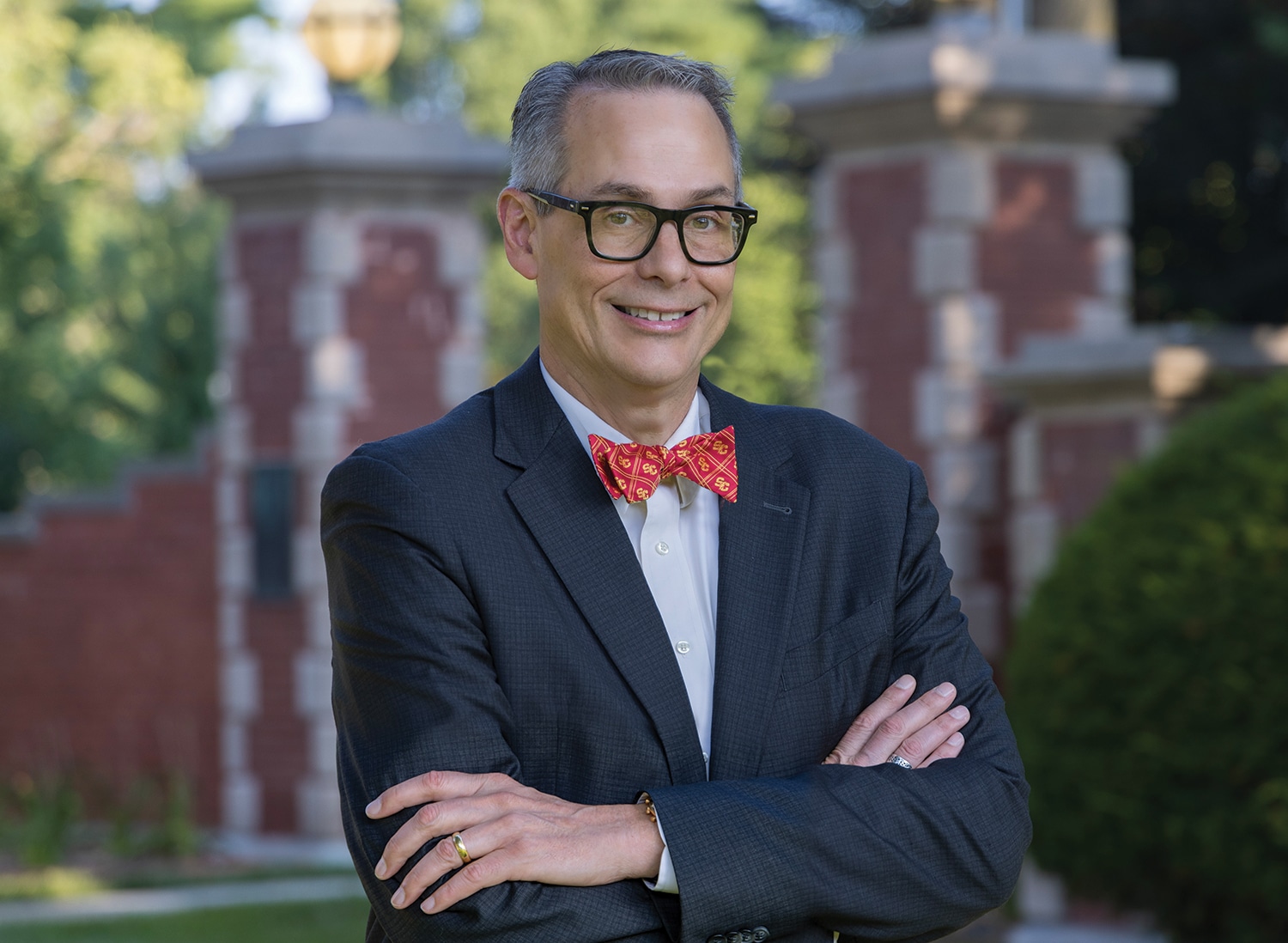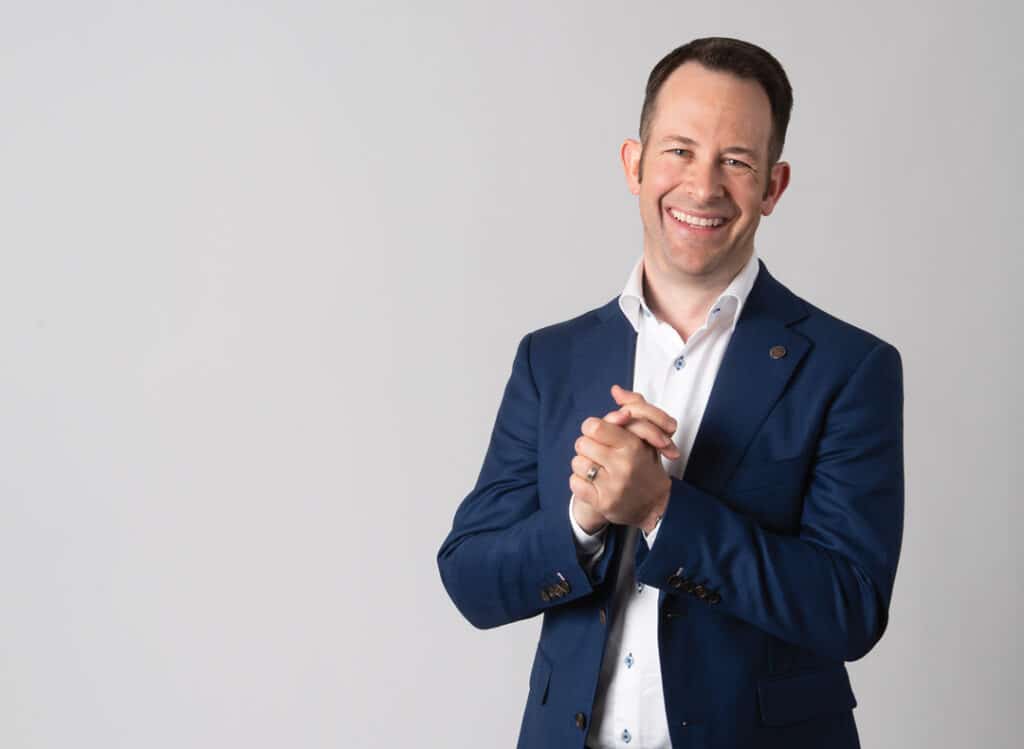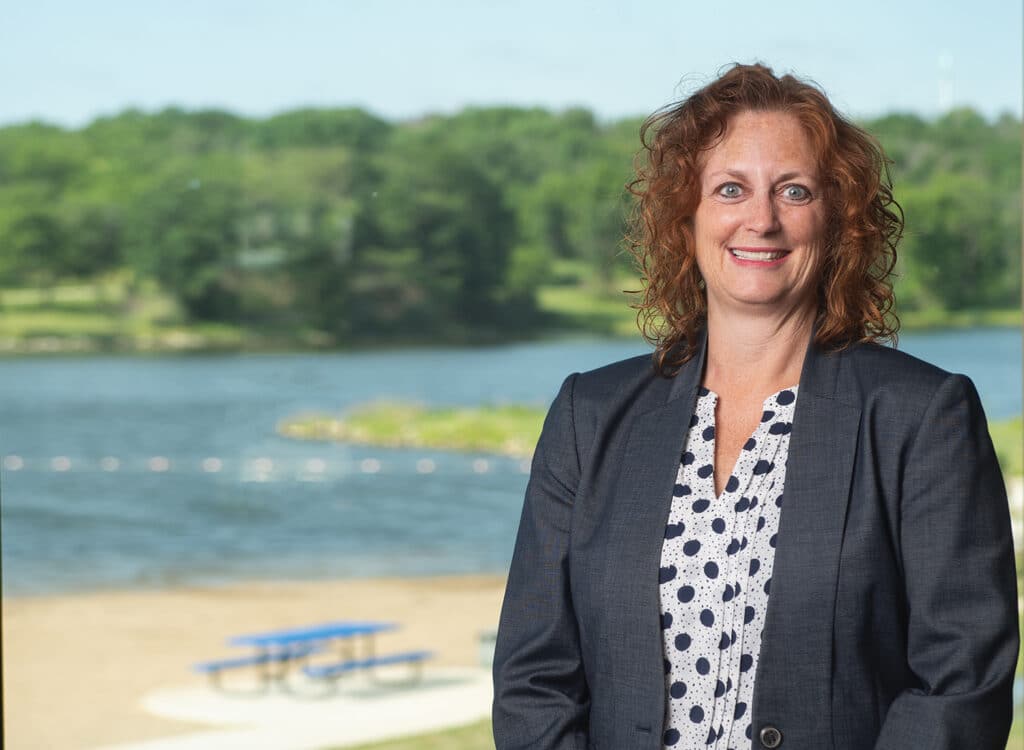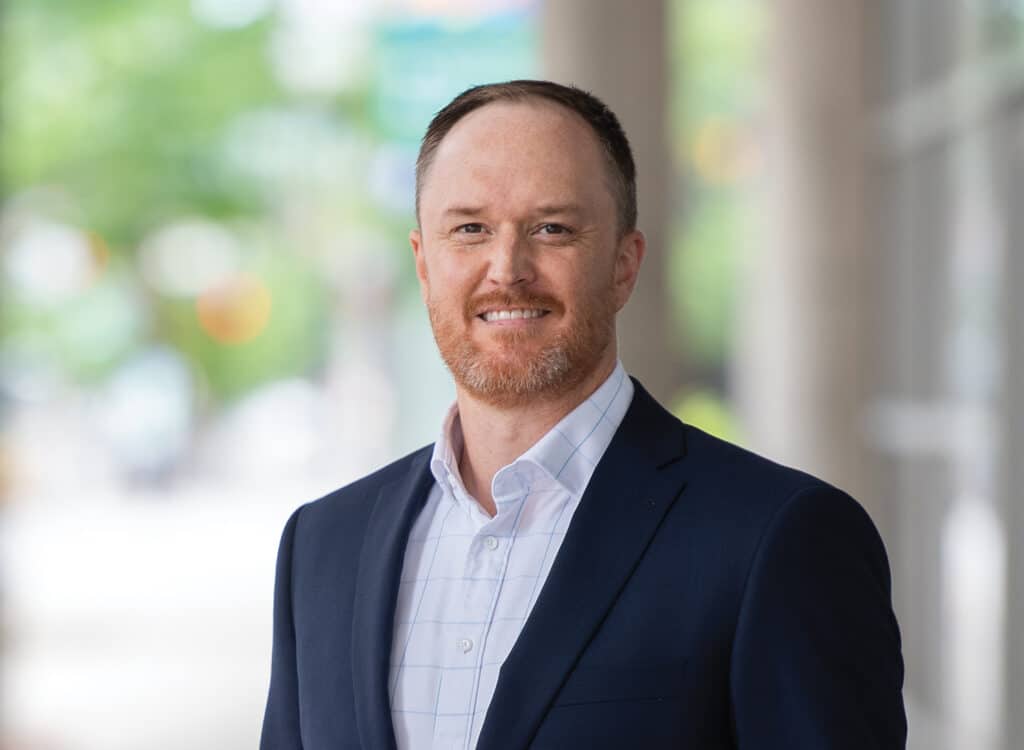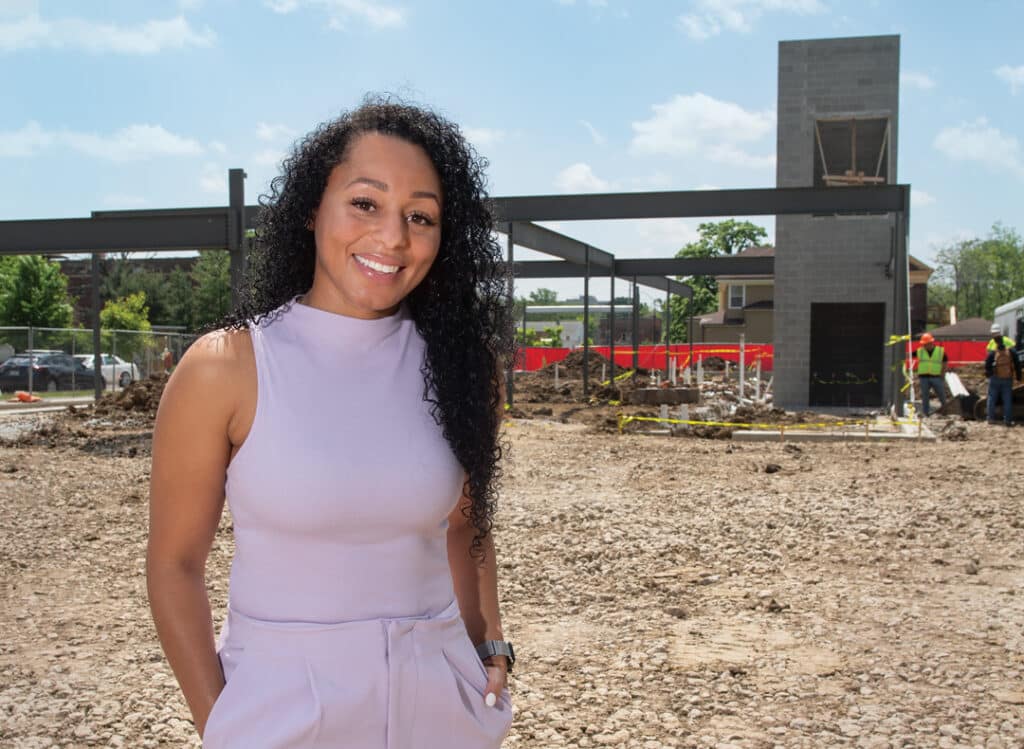A Closer Look: Jay Byers
President, Simpson College
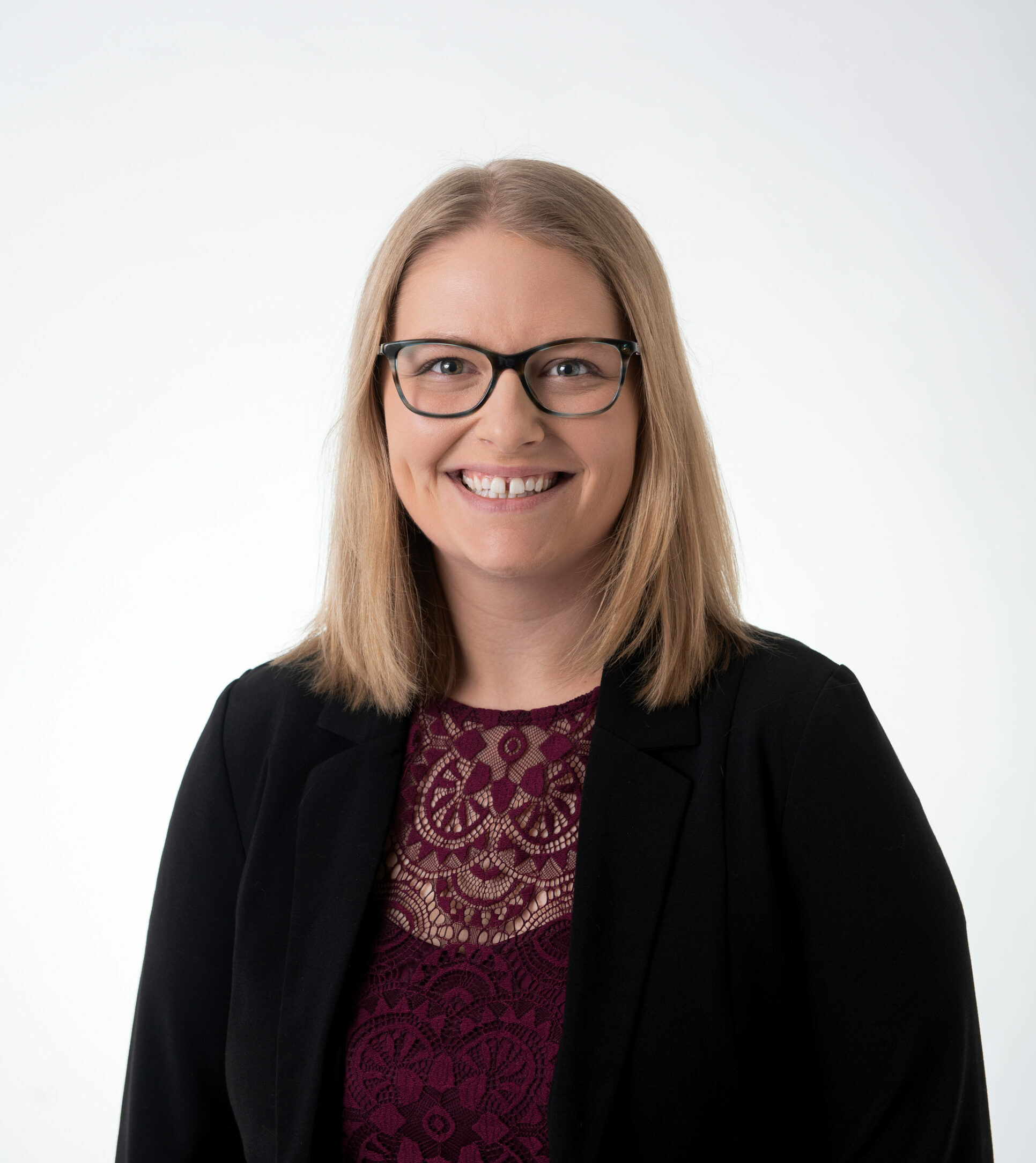
In one of Central Iowa’s most notable 2023 leadership transitions, Jay Byers departed his role leading the Greater Des Moines Partnership to take the helm of his alma mater, Simpson College, as president.
Byers started this summer, succeeding Marsha Kelliher, who announced her plans to retire in January 2023. He brings to the role a perspective on how colleges and universities can drive workforce and economic development from his nearly two decades at the Partnership pursuing growth of the Central Iowa region and regularly collaborating with higher education stakeholders.
He said his roles at the Partnership and serving Iowa Congressman Leonard Boswell provided the opportunity to build relationships with Iowa’s higher education leaders and learn about their challenges at the state and federal level for the last 25 years.
“I think I was around enough of them to say, ‘OK, here’s some things that I saw that they did that I was really impressed with,’ and so that’s what I’ve tried to bring here as well. I think I had the benefit of doing that best practice analysis without knowing that I was going to be working in higher education. I’ve just spent a lot of time on all these campuses and partnered with them at the Partnership on a lot of different things … I think bringing that set of knowledge and that set of relationships has been helpful here.”
The strategic goals Byers set in his first semester are continuing to build the college’s brand, community and future and asking, “How can we do it even better?” We recently caught up with Byers to learn more about these goals and his vision for Simpson’s role in the Greater Des Moines region.
This Q&A has been lightly edited for clarity and length
What attracted you to the role of a college president?
I came from a family of educators. Both my parents were teachers. My dad was for many, many years, a high school administrator and basically had every job at a school with the exception of superintendent. I definitely grew up with education and again, I’ve always been passionate about higher education. I’ve always been passionate about Simpson, and after I got my Juris Doctor degree, I knew that I was eligible to potentially teach. Coming back to Simpson to teach political science courses was very rewarding. I really liked that a lot.
I think when this position came up and I had some board members who approached me to say, “Hey, is this something you’d ever consider?” A few years ago, it was maybe not something I was really thinking about, but the more I thought about it, the more it made sense. I’m very passionate about the future of higher ed. I’m very passionate about Simpson, and I think there’s very much a pathway of success moving forward. I made the determination that with my background and my connections and that passion and that connectivity that I thought I could come here and make a difference. And I could make a difference not only here for Simpson and making sure that we have a very successful future here but also what can we do collectively as a college to create that new model of success moving forward? There’s plenty of headwinds, as we all know, in higher education, but what does that model look like?
I think it’s all about honoring the past but really setting the course and vision for the future. What can higher ed look like and how can Simpson model that? That was very exciting to me, and that’s really what I’ve been experiencing here as well. There’s a lot of things here we’ve done really well for many years, and as we look to the future, I think there’s ways that we can really lean into what the future of higher ed needs to look like.
As you’ve transitioned into the new role, what similarities or differences have you noticed compared with your job at the Greater Des Moines Partnership?
At the Greater Des Moines Partnership, we spent a lot of time talking about talent, scaling up talent and working with our higher education partners, so I’ve spent a lot of time with lots of different college presidents, whether that’s government affairs issues or just their role in terms of recruiting students and talent to move to this area and skilling up existing talent. In so many ways colleges and universities are the lifeblood of regions, and for many years, Simpson has been a talent magnet for Central Iowa and the entire state. I think that with what I bring from the Partnership, I’m really trying to bring that perspective as well. You also have connectivity with employers, and the business community, and the public officials, and the nonprofit sector, not only in Central Iowa but across the state. And how can Simpson continue to be a player in being part of that system to recruit and scale up talent for the region and the state?
There’s also some other similarities in that colleges and universities play an important economic development role. What does that mean for not only Indianola and Warren County but the entire region, and again, on the talent side with talent recruitment, but also in terms of that quality of place and quality of life amenities that we have for the residents who not only live here but live in the entire region. I think in some ways this job has been more similar to my job at the Partnership than I might have thought. We’ve got a large board — I had a large board at the Partnership. At the Partnership, I worked very closely with what we called the senior team. Here, we call it the cabinet. What we’re doing is different, but overall, I think that the day-to-day and how that operation works is a little bit more similar than I might have even thought coming in.
Where are there opportunities for Simpson to expand its role in the Central Iowa region by tapping into the connections and partnerships you have built throughout your career?
I think that there’s just lots of opportunities. I have now joined the Indianola Chamber of Commerce board. I am now a board member of the Warren County Economic Development Corp. board and I am the private college representative on the Iowa Economic Development Authority board. I want to make sure that we have a seat at the table at the local, county, statewide level. What can we do moving forward to build on those relationships and be a part of lots of different coalitions and partnerships to strengthen the region and to strengthen our local community, and what is our part? A big part of that is making sure you’re at the table and we’re doing that and we’re going to be doing more of that. I think in terms of working with our stakeholders, it’s what can we do to make sure that they know that this is a great option for students who are graduating from high school.
Our enrollment numbers this year were up significantly year over year. With our first-year class, we were up 14%; if you include transfers, we’re up 11% year over year. So what can we do to strengthen those relationships with all of our employers to say, “Hey, we’ve got a lot of great students here that can be interns and full-time hires” in terms of meeting their talent needs. It’s the No. 1 issue when I was at the Partnership and it still is that employers can’t find enough skilled talent. About 75% of our students are from Iowa, but about 80% stay in Iowa, so we are a net generator of new talent. We’re bringing out-of-state talent that’s staying here and keeping talent that’s here. So it’s what can we do to strengthen those relationships to make sure that our companies and our employers are finding that talent they need.
Simpson’s 2023-24 incoming class was its largest in five years. What have you learned about the short- and long-term recruitment efforts that contributed to that outcome?
I think our admissions team has just worked really hard and we’ve really been trying to tell that story in terms of who we are and what we do. I think that the Simpson Promise has been a great recruiting tool for us. I think investing in athletics has been a big part of that as well. We launched four new sports in the last couple of years with men’s and women’s gymnastics, men’s volleyball and women’s wrestling. That’s resulted in increasing our recruiting numbers as well. But again, overall, it’s what are we doing to tell our story? I think the other piece that we’ve done really well is trying to own our backyard and really working hard to recruit in Des Moines Public Schools and the Des Moines metro schools. It’s very much a growing region, which is very much a benefit for us because that means more students, too.
When it comes to recruitment, what contributing factors are in a college’s control and which are not?
There’s trends out there that are impacting everyone. There’s the cliffs that are out there just in terms of the number of college students nationally has been going down because during the Great Recession, people were having fewer kids. That cliff is not is not as steep in a place like Iowa as it is in some other places. Overall, some of the data will show the percentage of students and parents who still think that getting a college degree is important. The overall finances of higher education and political divisiveness — everybody’s dealing with those trends, whether it’s us, the regents universities or the community colleges, and not only in Iowa but across the country. The beauty of working at a place like Simpson is that we know the numbers we need to be successful. If we are putting together a product and plan that we know can be successful, then we’re confident that we can outperform those trends.
What pieces of the goals to build Simpson’s brand, community and future are you focused on in the short term?
In terms of the brand it’s what can I do to get out there in public, whether that’s being here on campus and visibility within the community, within the region, within the state, and then really showcasing that brand and what Simpson’s been doing. For example, we rolled out a new initiative called Take DSM by Storm, which was featuring some of our top alumni and their success stories and inviting our regional alumni to attend. Those have been really successful.
On the community side is strengthening those relationships at the city level and the county level, with the Des Moines Metropolitan Opera and the National Balloon Classic. Part of building community is that connectivity with our alumni base, too. I’ve been spending a lot of time traveling. I’ve been to California, Omaha, Minneapolis, Kansas City, and Dallas having alumni events, connecting with alums.
Really building the future, in the short term, it’s all about what can we do to improve recruitment, improve retention and focusing on resources. We call those the three Rs here. We’ll continue to move forward with our existing strategic plan as we’re implementing that but then work with all of our stakeholders in terms of what does that future strategic plan look like and how do we build that?
What needs or goals in the Central Iowa region do you think can see progress in the near future by stakeholders in the community coming together and collaborating?
Simpson co-hosted Iowa’s Great Debate. It’s a passion for me as I was a political science professor and spent a lot of time with the Partnership about how do you get people to work together?
We’re at a time in this country right now of extreme political divisiveness. But what can we do to be a model in terms of, “Hey, we can still come together, we can find common ground, red and blue can still work together, urban and rural and suburban can work together.” And how can we model that? That’s in many ways what the Iowa Great Debate is all about is showcasing that not only is that still possible, but at Simpson, our students can help model the way and maybe teach some lessons to some of the adults out there right now who are struggling with that.
We put our speech and debate team in front of not only the community on campus but the Greater Des Moines community and the business leaders so they can see in this Lincoln-Douglas style of debate that we can still debate tough issues. But we can do it with civility, and we can do it with facts, and we can still listen to the other side without just demonizing the other side. Those are the opportunities that we’re looking for again, in terms of how can we be part of our community, but how can we be a part of those solutions as well? Simpson being located in Indianola is very symbolic of that as well because Indianola in many ways is a bridge between rural and urban Iowa. We have a lot of the attributes of a traditional county seat, smaller town Iowa. At the same time, we’re very much a growing, thriving suburb of Greater Des Moines, so we represent both.

Sarah Diehn
Sarah Diehn is digital news editor and a staff writer at Business Record. She covers innovation and entrepreneurship, manufacturing, insurance, and energy.

